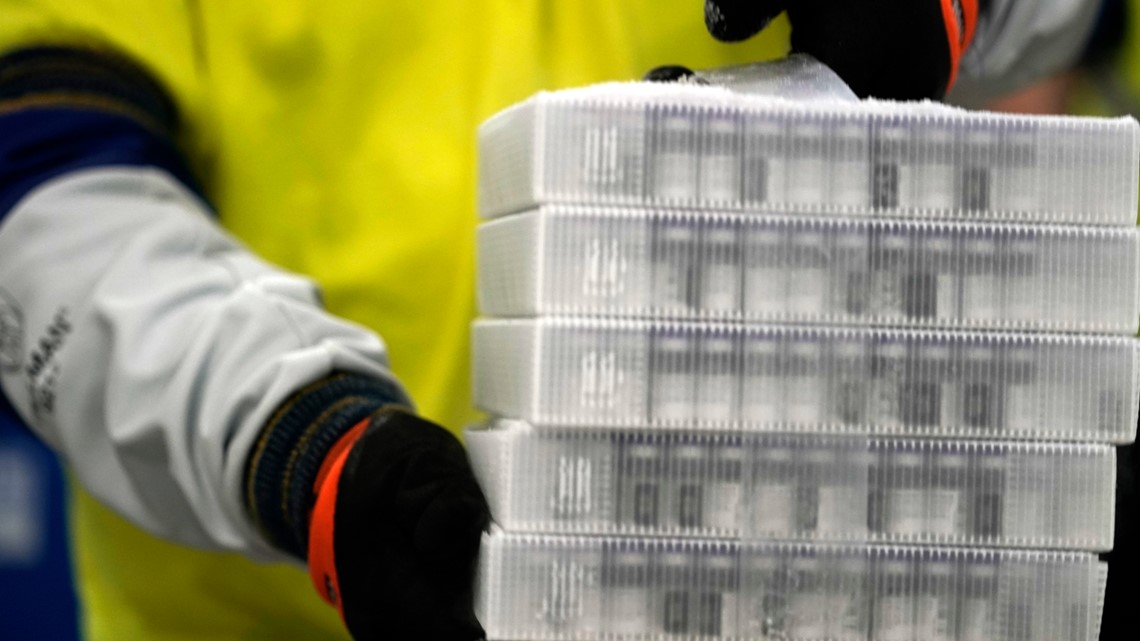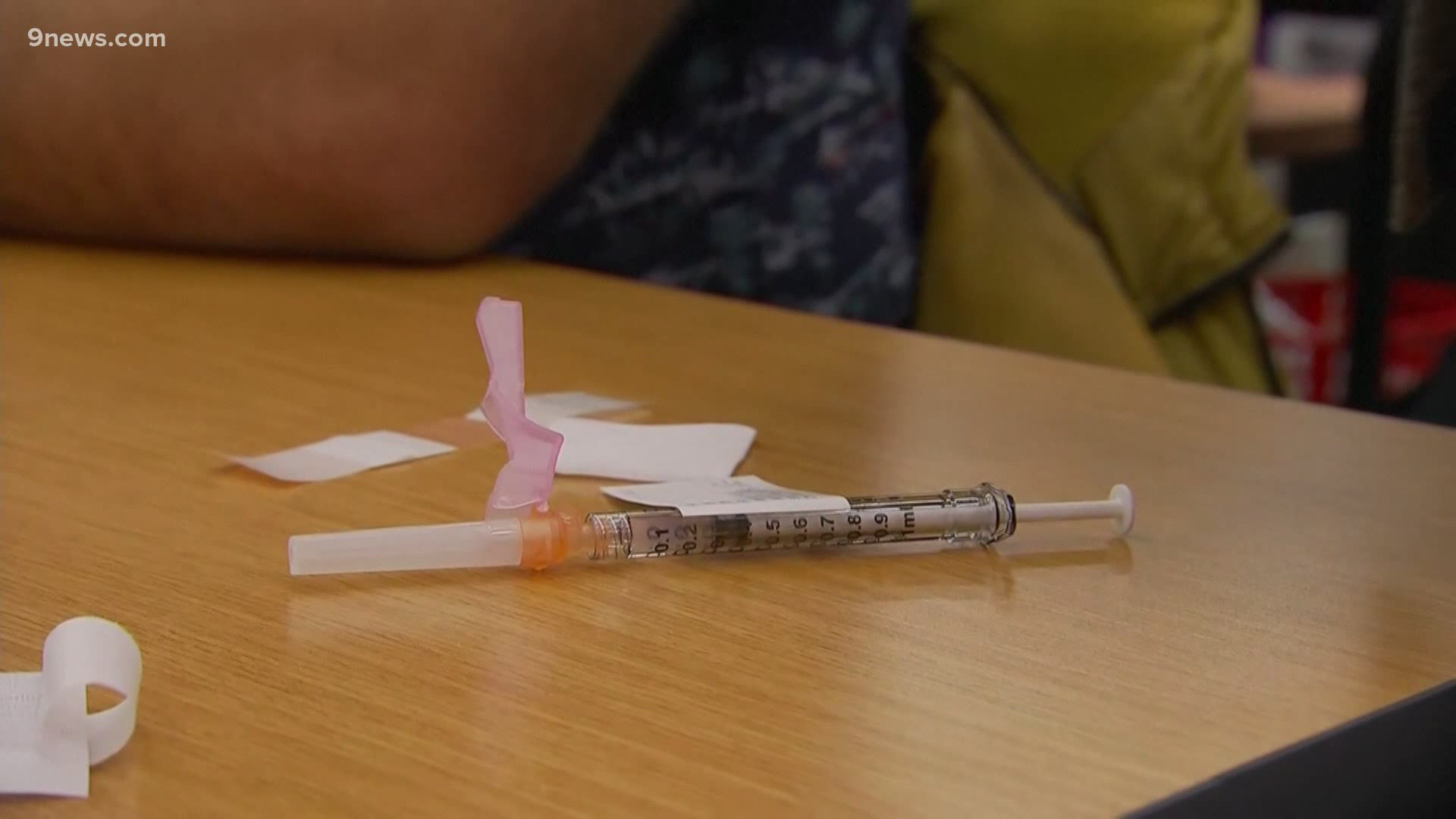DENVER — With the Pfizer vaccine set to arrive in states as early as Monday morning, people still have questions about logistics, safety, and efficacy.
In Colorado, people who have direct contact with COVID-19 patients for 15 minutes or more, such as emergency room workers and staff at long-term care facilities, will receive first-priority vaccines.
They will be followed by additional healthcare workers, staff at dental offices, hospice workers and first responders, which are all included in the first phase of the three-phase distribution plan.
We took your questions about the vaccine to 9Health Expert Dr. Payal Kohli.
(Editor's note: Responses may have been edited for context and clarity.)
Jacob: What are the side effects and how long will they last?
Dr. Payal Kohli, 9Health Expert: "The most common side effects of the COVID-19 vaccine from Pfizer are really what you would feel with the flu shot. So, most people feel arm pain, a lot of people feel fatigue, malaise, muscle aches, chills, and some people feel fever. The side effects are probably going to be more pronounced after the second dose than the first because the first dose is more meant to tickle the immune system. The second dose really does launch a full-blown immune response. Remember the side effects are not you actually getting ill with the virus. It's just a nonspecific marker of immune activation, that your immune system is revving up, and learning how to make antibodies to fight the virus. Most of these side effects usually last about a day or two. Sometimes they can last for several days but for most people in the trial, it was 24 to 48 hours."
Laura: Is it safe for people on immunosuppressants?
Dr. Kohli: Immunosuppressants can modulate your immune response and change the way that your immune system responds. These individuals were not studied in the clinical trials, and we don't know, number one, if the vaccine is safe for them and number two, and importantly, if it's effective for them. Humira can target the immune system so if you give somebody this vaccine, and they're on Humira, their immune system may not respond to launch antibodies. So, you should discuss your specific situation with your rheumatologist or another doctor, but it may not necessarily lead to the same type of responses in immunocompromised people or those on immune-modulating medications, as it does in the rest of the general population.
Sam: What about the concern of antibody-dependent enhancement with this vaccine?
Dr. Kohli: Antibody-dependent enhancement is a theoretical concern with every vaccine. It essentially means when you give somebody the vaccine and teach their immune system how to fight the virus when the immune system actually sees the virus, it almost responds to it as it would to an allergy, for example, a peanut allergy, and it overreacts and goes into an anaphylaxis type of response. This type of antibody-dependent immune enhancement was initially observed in mouse studies. Essentially when mice were given vaccines that had the capsid or the envelope protein. We do not see as much of this, thankfully, with a spike protein which is what is encoded in the vaccines the mRNA vaccines that Pfizer is making, and thankfully in the clinical trials we have not actually seen any individuals thus far have this type of immune enhancement. All of this suggests that this is probably less of a realistic possibility. It continues to remain a theoretical concern but has not played out.
Kathy: If you have tested positive and recovered, do you need to get the vaccine?
Dr. Kohli: Even if you've tested positive and recovered from COVID, I would recommend that you get the vaccine. The CDC has not issued any formal guidance on this at this point, but scientifically it makes a lot of sense because number one, not everybody makes antibodies when they recover. Number two, even those individuals that make antibodies, they may start to wane or go down over time as early as two to three months following infection. Number three, we don't yet know if natural immunity is similar to vaccine-mediated immunity. In other words, the vaccine could induce a much stronger and much longer-lasting immune response than necessarily natural infection would.


O'Shay: Will the list of ingredients be made public? Will the makers of the vaccine be held liable for any potential harm caused?
Dr. Kohli: The list of ingredients in the Pfizer vaccine has already been made public and all the FDA briefing documents. It’s a short list and, in fact, the vaccine does not even include any preservatives. So, that is available for anyone to review at any time.
The vaccine maker can't really be held liable so to speak, unless of course there was a lack of transparency or some deceptive information, because this is an ongoing investigational product, and it's been approved under emergency use authorization, which means it's really with the caveats that we haven't fully studied it, but yet we believe that the benefits outweigh the risks. Certainly, adverse effects may emerge. These will have to be issues we discuss but in terms of liability, because it's an investigational product if something were to come out of it, the company wouldn't necessarily be held liable because we're still learning about this scientifically.
Tony: Is there any information on whether or not this vaccine is appropriate for organ transplant recipients?
Dr. Kohli: Organ transplant recipients were obviously excluded from the clinical trial so, again, this is a bit of a black box. Often when you receive a solid or even a liquid organ transplant, you are on immunosuppressive drugs, and immunosuppressive drugs can alter your body's immune response to the vaccine. So, this is an area that really remains unknown at this time, but we'll continue to really investigate because obviously recipients of organ transplants are some of the highest risk people out there. They're immunocompromised and they certainly would be at high risk of complications from COVID-19. So, we do need to think about how to safely administer these vaccines to these individuals, but we don't yet know if their immune responses would be comparable to what we are seeing in the clinical trials.
Sandra: If you’re vaccinated, why still wear a mask?
Dr. Kohli: People may be wondering this and it’s a really good question. If you're vaccinated, do you still need to wear a mask? The answer is yes, for several reasons. The first is we don’t yet know whether the vaccine just protects the individual getting the vaccine, or also protects those around them. In other words, if I get the vaccine, is it just me that's going to be protected or will it also ensure that I can't transmit the virus to others? At this point, this is an unknown question. Number two, many of the people around us will not be able to get the vaccine. We don't have yet have data on pregnant women, on nursing women, we don't yet know much about kids under the age of 12, and we also know that people with allergies can't get the vaccine. So, in order to protect those individuals, everybody else should really try to get the vaccine, in order to slow the spread of the virus. So, for these reasons and of course, also the fact that wearing masks has kept flu activity in Colorado at less than 0.1% so far this winter. So, there are so many good reasons for us to continue to wear masks, even after we get the vaccine.
Jess: Will this be a one-and-done (with two doses) type of shot or will it be a vaccine we need to get every year?
Dr. Kohli: You know, you're asking the million-dollar question and the answer is we just don't yet know. So what we do know is after the second shot, it takes about two to four weeks for your immunity to build up. We know that it's lasted for at least three months in several clinical trials, but we don't yet know if it's going to last for several years, or just a few months. Immunity to natural infection is showing us that it can start to wane as early as two to three months after natural infection. There have even been some potential cases of reinfection. So, at this point, it's entirely a guess as to whether or not this will be a one-time deal only or we'll have to get it over and over again. Based on the fact that the coronavirus is part of a coronavirus family of viruses that cause a common cold, that you can get over and over again because the immunity goes down, I suspect this is going to be one of those vaccines that we will have to get multiple times, possibly every year.
Brittany: With regard to the warning about those with severe allergies, what counts as a severe allergy?
Dr. Kohli: Severe allergies have been a contraindication and a warning for Pfizer to their vaccine. What we define as severe allergies are life-threatening allergic reactions. That includes anaphylaxis, that includes anaphylactoid reactions like red man syndrome from vancomycin, and it really includes anyone that carries an epi-pen, whether that's for reactions to medications or to foods or other types of substances. It does not include those individuals with seasonal allergies for which they take antihistamines and milder allergies, milder food allergies. We're really talking about severe, life-threatening allergic reactions. If you were to have an allergic reaction to the vaccine, thankfully, most likely, it would manifest itself within the first hour of vaccine administration. It makes it a lot less likely that you get the vaccine and then several days later, you would have some sort of an allergic reaction.
Vale: Is it safe for diabetics?
Dr. Kohli: The good news is many different types of people were studied in the clinical trial, including those with diabetes, those with high blood pressure, those with heart disease, those with chronic medical problems. We really did find that the efficacy and safety profile of the vaccine was very similar to these groups, as it was in the general population.
Raenell: How quickly does immunization work?
Dr. Kohli: The first dose is given and then 21 days later, you get the second dose. About two to four weeks after that is really when you get to your peak antibody levels, which is really what we want to see.
Tara: How does this vaccine affect those with autoimmune disorders?
Dr. Kohli: Autoimmune disorders, as you know, are where the immune system malfunctions. So, this is really a black box when it comes to the vaccines because we don’t know how those with autoimmune disorders are going to respond to the vaccine, how their immune system is going to take it. We also don’t know if medications those individuals may be taking would alter the efficacy of the vaccine because, of course, those medications modulate the immune system itself. With respect to Type 2 diabetes, which is not autoimmune-mediated, there were patients with diabetes in the clinical trials that responded just fine just like the general population. With respect to Type 1 or autoimmune diabetes, this continues to remain a little bit of a question mark in terms of whether their immune responses would be similar to those of the general population.
SUGGESTED VIDEOS: COVID-19 Coronavirus

